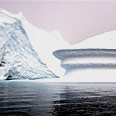
Global warming? Next decade could be cooler, says study
German scientists publish new study suggesting Gulf Stream changes will temporarily weaken over next decade, leading to slightly cooler temperatures in North Atlantic, North America, Europe; stabilize temps in tropical Pacific
Global warming could take a break in the next decade thanks to a natural shift in ocean circulations, although Earth's temperature will rise as previously expected over the longer term, according to a study published last week in the British journal Nature.
Climate scientists in Germany base the prediction on what they believe is an impending change in the Gulf Stream – the conveyor belt that transports warm surface water from the tropical Atlantic to the northern Atlantic and returns cold water southwards at depth. The Gulf Stream will temporarily weaken over the next decade, in line with what has happened regularly in the past, the researchers say.
This will lead to slightly cooler temperatures in the North Atlantic and in North America and Europe, and also help the temperatures in the tropical Pacific to remain stable, they suggest.
Last year, scientists in the UN's Intergovernmental Panel on Climate Change (IPCC) said that by 2100, global average surface temperatures could rise by between 1.1 Celsius and 6.4 Celsius (1.98 and 11.52 F) compared to 1980-99 levels. In the next 20 years alone, the global climate would warm by around 0.2 degrees Celsius (0.36 degrees Fahrenheit) per decade, the IPCC said.

Stabilizing the greenhouse effect (Illustration photo: Hana Gerstein)
These calculations are based on atmospheric concentrations of carbon gases – the famous "greenhouse effect" in which solar heat is stored in the air rather than released into space. Climate experts have long warned, though, that warming is unlikely to be a gradual trend, but a movement in stops and starts. The main reason for this is that the oceans -- the biggest store of heat – go through natural cycles of circulation.
Not disputing IPCC's figures
The authors of the new study stress that they do not dispute the IPCC's figures: "Just to make things clear, we are not stating that anthropogenic (man-made) climate change won't be as bad as previously thought," said Mojib Latif, a professor at the Leibniz Institute of Marine Sciences in Kiel, northern Germany."What we are saying is that on top of the warming trend, there is a long-periodic oscillation that will probably lead to a lower temperature increase than we would expect from the current trend during the next years."
Fellow author Johann Jungclaus of the Max Planck Institute for Meteorology in Hamburg, likened the trend to "driving from the coast to a mountainous area and crossing some hills and valleys before you reach the top."
In some years, the natural long-term variation in ocean circulation would work in the other direction, temporarily pushing on the warming accelerator, Jungclaus warned.
In a commentary also published by Nature, Richard Wood, a scientist at Britain's Hadley Centre for climate change, said it was useful to get some idea about the jagged variability of global warming.
Such information could be precious for planners seeking to beef up protection against the impact of climate change, and who need to know when these expensive defenses have to be completed. But Wood queried the study's focus on the Gulf Stream, saying its turnover was affected not just by temperature but also by saltiness.
The salinity of water entering the North Atlantic is being affected by melt water running off Greenland glaciers and Siberian permafrost, and some research suggests this is already slowing the conveyor belt.










